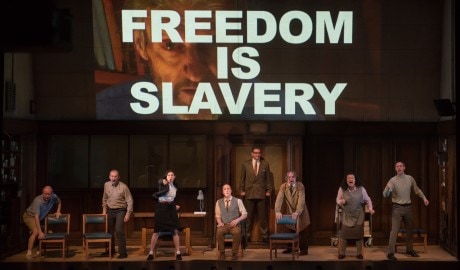Prepare to be assaulted!
Head-on by Headlong Theatre’s 1984, now on stage at STC’s Lansburgh Theatre.
George Orwell’s novel has become the iconic symbol of the totalitarian surveillance State.
Big Brother, before it became America’s own reality game show, was (and still is) the figurehead leader of Oceania, the ruling Party.

But don’t expect narrative when you strap yourself down at the Lansburgh. The story you are about to experience (seeing the performance is not an option as high intensity lights pulverize your retinas) is not some fictional account of some fictional world created by some fictional George Orwell.
This experience happens NOW — not tomorrow or last month or in 1984.
For you are as much Winston Smith, the hero of this theatrical phenomenon, as is the actor playing him on stage, Matthew Spencer.
You and your rebel self are about to be assaulted.
Mr. Spencer does a phenomenal job portraying the Thought Criminal Winston, the man who dares to think differently than the media and government demand. In other words, you are the person who still has enough language to articulate meaning, to describe an experience, to declare that what is is not necessarily what is said.
Hara Yannas plays Julia, a suspected member of the dreaded Thought Police, who seeks Winston out, not to entrap him in thought, but to entangle him in love and provoke a rebellion.
Ms. Yannas’ performance is exuberant and enthralling.
In fact, all the performances in 1984 are engaging and cut to the bone.
Tim Dutton plays with bone-chilling certainty the no nonsense O’Brien, an inner Party bureaucrat who is the master of deception.
Stephen Fewell portrays Charrington, the antique dealer who is a real member of the Thought Police.
Ben Porter is Syme, the intellectual who thinks too lucidly and who, thus, becomes a threat to the Party.
Mandi Symonds plays Mrs. Parson, the neighbor whose children are members of the Youth League.
Simon Coates plays her husband, Parsons, the ordinary Party member who believes everything he is told.
Christopher Patrick Nolan takes on Martin, O’Brien’s servant.
Finally, Koral Kent and Anaïs Killisn play the Child, on alternate nights.
But Headlong’s 1984, adapted for the stage by Robert Icke and Duncan MacMillan, isn’t so much about the performers as it is about the raw experience of the play itself.
Directed by Icke and Macmillan, such is the totalitarian experience of 1984.
Designed by Chloe Lamford, the visual feast of the tangible, the projected, and the “seen through tinted glass” stimulates the senses as few theatrical experiences will.
Natasha Chivers’ lights only intensify the spectacle, as does the sound design by Tom Gibbons.
Then we have the video, by Tim Reid, which captures both real time close ups and off set bedrooms as well as on-stage expressionistic nightmares.
You literally won’t know where you are or what time it is.
So you will begin the show assuming whatever it is you might assume about life, in America or elsewhere.
You know the nation has two major political Parties, or maybe it really has only one.
You know we have a terrorist problem, or maybe a bunch of terrorist problems, which might, in some cases, be some other kind of problem.
You know we are engaged in various wars in various places, or maybe they aren’t really wars but “conflicts” as the people fighting aren’t soldiers but “combatants”. And they aren’t against countries but individuals who may or may not be connected to some organization or other that calls itself a country, or a religion, or….
You know, by now, we have in this country extreme economic polarization, that might be something approaching an oligarchy (maybe not the “oligarchical collectivism” preached by Oceania in 1984 but…).
You also know we have surveillance cameras everywhere (and you really do know we have surveillance cameras everywhere particularly when you get a speeding ticket), and they have facial recognition as well.
Additionally, you might suspect that your phone is bugged, and that your email is being read, or that your every thought is being manipulated by powerful invisible forces.
The point is, by the end of 1984 you will leave the theatre cleansed of all those troubling thoughts. You will leave either accepting your fate, which is total uncertainty, and surrender to hearsay, which is total Big Brother, or you will begin again.
If you follow the first choice, you will agree with whatever you are told, keeping your head down as you venture forth to your home.
For if, as the saying goes, Knowledge is Power, you will have no power because you will have no knowledge, only belief.
In other words, you will believe that 2 plus 2 equals 5. Or maybe 6. Or possibly 4.
On the other hand, if you choose to begin again and start constructing your knowledge anew, out of memory, and experience, and a faith in your own capacity for simplicity, then….
But 1984 does not offer that kind of hope.
For the totalitarian experience of George Orwell is not wrapped up in some authoritarian, Trump-like figure whom we hysterically fear. Rather, it is embedded in the machinery of power itself: to manipulate, to erase, to disguise or disfigure, to cajole or to conjure a false narrative, seemingly truth, but decidedly not.
All you really can do is prepare for the assault.
Running Time: One hour and 50 minutes, without an intermission.
Headlong Theatre’s 1984 plays through April 10, 2016, at Shakespeare Theatre Company, performing at Lansburgh Theatre – 450 7th Street, NW, in Washington, DC. For tickets, call the box office at (202) 547-1122, or purchase them online.
RATING:




